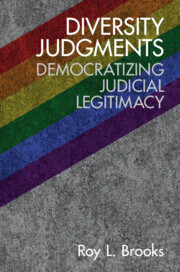Book contents
- Diversity Judgments
- Diversity Judgments
- Copyright page
- Dedication
- Contents
- Preface
- Acknowledgments
- Introduction
- Part I Asian Americans
- Part II African Americans
- Part III Women
- Part IV Latinx
- Part V Native Americans
- Part VI LGBTQ
- Part VII Intersectionality
- Part VIII Outsiders v. Outsiders
- Part IX White Males
- Part X Situational Outsiders
- Index
Introduction
The Framework
Published online by Cambridge University Press: 10 March 2022
- Diversity Judgments
- Diversity Judgments
- Copyright page
- Dedication
- Contents
- Preface
- Acknowledgments
- Introduction
- Part I Asian Americans
- Part II African Americans
- Part III Women
- Part IV Latinx
- Part V Native Americans
- Part VI LGBTQ
- Part VII Intersectionality
- Part VIII Outsiders v. Outsiders
- Part IX White Males
- Part X Situational Outsiders
- Index
Summary
Our Constitution divides governmental power among three branches of authority: legislative, which makes our laws (Article I); executive, which enforces our laws (Article II); and judicial, which interprets our laws (Article III). This formulation is, however, deceptively simple. We know, for example, that the judiciary also makes law – the common law, or “judge-made law” – and legislates interstitially between the gaps of the written law, often left vague by Congress and the Constitution itself – “due process,” “equal protection,” and so on. We also know that even clearly-written laws can lead to absurd or outrageous results, particularly when applied to novel situations, if not artfully interpreted by judges. This point is famously illustrated by the English common law. To avoid absurdity in the application of a law (designed to prevent criminal behavior) that made it a crime to “draw blood in the street,” we would not, Blackstone instructs, expect a judge to apply the law to a doctor “who opened the vein” of a person who fell ill in the street. Judges are called upon to do justice – that is their ultimate role in a democratic society – but the pursuit of justice begs a question American judges and legal scholars have been probing since the beginning of our republic: How does a judge, an unelected official, decide cases through a process that a democratic society can regard as just and, hence, legitimate? Judges, most especially Supreme Court justices, have considerable leeway in responding to this question.
- Type
- Chapter
- Information
- Diversity JudgmentsDemocratizing Judicial Legitimacy, pp. 1 - 50Publisher: Cambridge University PressPrint publication year: 2022

